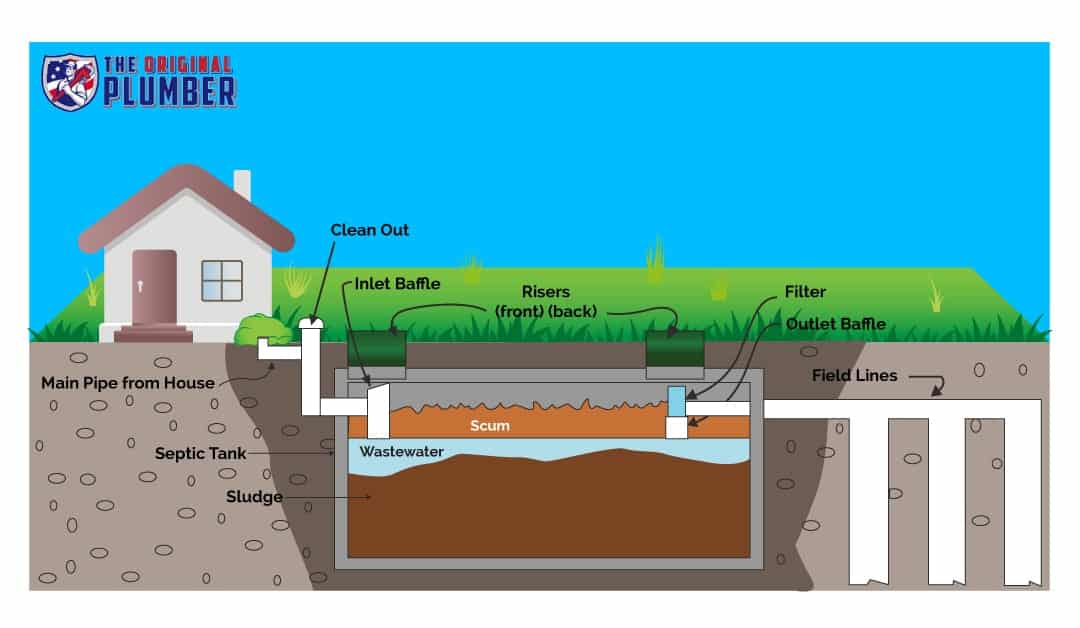- ★★★★★ 1000+ 5 Star Reviews
- Call Us 24/7

Call today to schedule service. Offer valid for new and existing customers.
Claim Discount Today!As a septic system only needs to be pumped every three to five years, it’s not exactly at the forefront of your mind when you think about home maintenance. However, some tanks require care more often. For instance, when you have a large family or use a garbage disposal. It’s important to keep to always keep in mind the last time you had your tank maintained because, if you wait too long, problems are bound to occur.
Delaying septic tank pumping and maintenance can mean the raw sewage backs up into your house or yard, creating a smelly mess that contains all sorts of bacteria, viruses, and parasites. You don’t want to expose yourself, your children, or your pets to such health hazards.
Regular maintenance keeps the drains flowing efficiently. This prevents those occasions when slow drains take a long time to empty the sink, or you have to shower in standing water.
Read More:
As with all mechanical systems, repairs can get very costly. Not only are labor costs involved, but you have to consider the costs of parts as well. Pumping and cleaning your tank every couple of years prevents such trouble from happening. Also, it’s when the tank is pumped and cleaned that many problems are identified. After our capable technicians care for your tanks, they’ll inspect them and the drain field. This is the ideal time for septic tank repair.
Our technicians look for signs of trouble, such as cracks or leaks in the tank itself. When this occurs, repair or replacement is required, or the raw sewage escapes into your yard and possibly the water supply. Such unsanitary conditions impact people, plants, animals, and the environment. Prevent trouble with routine maintenance from our skilled technicians. Septic tanks require routine maintenance which can be a dirty job. Not only does septic tank pumping services need to be done, but it needs to be handled properly to avoid serious consequences
Before getting into the details about septic tank pumping, let’s first start by getting into some of the basics.
In a conventional septic setup, you will find that it works as follows:

Everything that goes down the drains in your home, including sinks, showers, and toilets, will come through one main drainage pipe and enter your septic tank.
Your septic tank is buried underground, usually in your back yard, and is a water-tight container made from concrete, fiberglass, or polyethylene. Your household wastewater is held in the septic tank long enough for solids to form at the bottom, creating sludge. All other greases and oils will float to the top, creating a scum layer.
Your septic drain field area, also known as a leach field, is a shallow excavation area that is unsaturated soil and covered. Any liquid wastewater, known as effluent, is removed from your septic tank and travels into the drain field through piping. The soil acts as a filter for the wastewater, which will discharge it into groundwater.
There are specific compartments or T-shaped outlets within your septic tank that prevent the sludge and scum from leaving the septic tank to go to the drain field area.
If your leach field gets overloaded and has too much liquid, it may result in flooding. Flooding in your drain field area can cause sewage to flow to the ground surface or cause other backups in your household plumbing, including toilets and sinks.
Lastly, the wastewater will percolate into the soil. This process removes any of the harmful bacteria, viruses, and chemicals.
Read our blog on how to find your septic tank.
If you are still unsure, it is never a bad idea to have a professional come out to check for you.
On average, each household operating on a tank should have septic cleaning services, including septic tank inspections every three years. Residential septic tanks have a design you should have pumped every three to five years, depending on its usage.
The major influences on the frequency of your septic tank pumping service include:
It’s a dirty job, but luckily you can hire The Original Plumber & Septic for all the services you need. We’re a certified Atlanta septic tank service provider that can handle it for you. If you’re in a new house and don’t know the last time the previous owner had the system inspected, it’s a good idea to schedule septic tank service as soon as possible to avoid potentially expensive repairs or replacement. Call us now for a easy estimate.
Septic Tank Cleaning Cost
The national average septic tank cleaning cost runs around $400. Depending on the tank’s size, US homeowners can spend anywhere from $250 to $500. For some, with huge-sized septic tanks, septic pumping can easily cost $1,000 and up. Call us at (855) 761-3823 for a septic tank service quote whether you need septic tank cleaning, drain cleaning, or another septic service option. Don’t forget to take advantage of our discounts!
It might seem obvious, but all water from your household will end up in the septic. That means, the more water your home uses, the more that will end up in the system. Water usage efficiency in the household ultimately results in the improved operation of the tank.
Today, you can find several different water-efficient household products, including:
Remember that everything that goes down the drains in your home will end up in your septic tank. Ensure your household does not flush anything other than human waste or toilet paper down toilets. Other things you never want to flush down your toilets or pour down your sinks or garbage disposal include:
The septic tank drain field is an integral part of your septic system, responsible for removing any contaminants from liquids that might emerge from your tank. Remember that it, too, needs to be maintained. As a rule of thumb:
Wastewater coming from your home has a lot of disease-causing bacteria and viruses, which are incredibly harmful. Additional pollutants found in wastewater include high levels of nitrogen and phosphorus, which properly functioning systems remove effectively.
If your septic tank is malfunctioning, it can cause groundwater contamination that could spread to your household and directly impact your neighbors.
Any contaminated household wastewater not only poses a danger to your and your neighbor’s drinking water but also to the environment. Contaminated groundwater can result in the release of bacteria, viruses, and other harmful chemicals into local waterways.
Inevitably, local streams, rivers, lakes, and other natural water resources are impacted. Make sure you maintain your septic tank to do your part to preserve local ecosystems.
You may hear the two terms used interchangeably, but there’s actually a difference between the two. When your septic tank is cleaned, all water is removed from the tank, along with the compacted “sludge” that lines the bottom. When your septic tank is pumped, some of the liquid, along with floating sludge and solids.
Which option you need depends on a variety of factors including:
The last time you had the tank cleaned or pumped:
If you have your tank pumped every three to five years, it’s relatively easy to remove the solids. The longer you go between pumps, the thicker the waste becomes, making it difficult to remove. In some instances, extra water may be added to the tank to help break it down. It may be necessary to break down the sludge layer using a stream of high-pressure water, in a process known as hydro jetting. If solids are so thick they can’t be broken down, it’s best to plan on repumping the tank every six to 12 months.
Root invasion:
If there are tree roots near the tank, they may become entangled with the sludge in the tank. If those roots cannot be removed, they will have to remain in the tank with the sludge.
Size of the access lid:
If the access lid isn’t wide enough, there’s a chance the hose won’t be able to reach the farthest sides of the tank.
Dividing walls:
If your septic tank installation occurred in the early 90s or beyond, it has two compartments. Both of these need to be pumped out each time. It’s not safe to assume the tank’s dividing walls are water-tight. It’s possible to pump out nearly all the liquid in the tank, but leave behind solids on the side that wasn’t cleaned out. If you’re not sure when your septic tank installation occurred, a septic inspection can help you determine its condition.
Look to our technicians to provide top-notch septic service for septic tank pumping, cleaning, and inspection. We are a locally operated septic company and offer upfront pricing with no hidden cost and always tell you exactly what needs to be done before we do it. Schedule an appointment today by calling our office.
If you are ever in doubt, don’t hesitate to call us right away. As one of the best septic services in the Metro Atlanta area, We take pleasure in providing high-quality work while providing top-notch customer service!. We’re ready and willing to help keep your system in top condition. Regular septic pumping is critical for the life of your septic system and can go a long way toward avoiding septic failure.
If it’s time for septic tank pumping service or other septic services get in touch with the team at The Original Plumber & Septic today! Our technicians are trained to handle septic systems throughout the North Metro Atlanta area and surrounding areas. We serve both commercial and residential customers. Call us to learn more about how we can help you!
Atlanta, Acworth, Kennesaw, Alpharetta, Holly Springs, Smyrna, Roswell, Canton, Cumming, Oakwood, Woodstock, Suwanee, Chestnut Mountain, Ellijay, Jasper, Clarkdale, Nelson, Lithia Springs, Milton, Ball Ground, Mableton, Marietta Georgia.